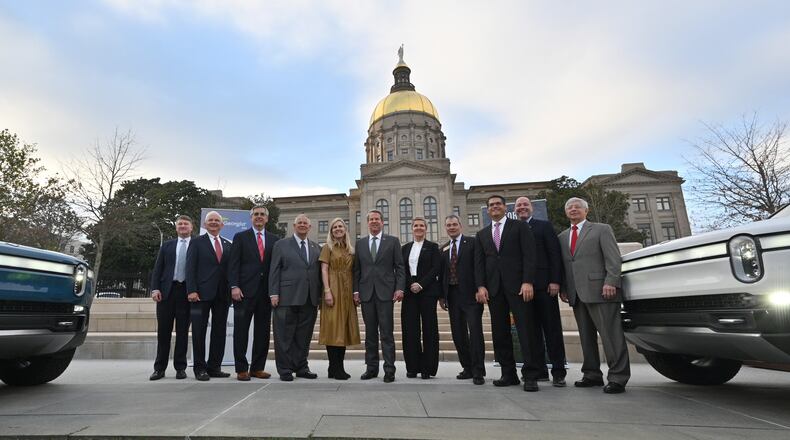A development authority east of Atlanta has voted to approve an “economic development agreement” for the planned $5 billion Rivian factory, outlining terms with the electric vehicle company, including environmental standards and taxpayer-backed incentives.
The agreement is a key milestone for the project planned near Social Circle and Rutledge and sets the stage for grading, permitting and other work to begin. But full details of the pact are not yet public and likely won’t be until early next week after the documents have been signed by the state and Rivian, spokespeople for the state and the local authority said Tuesday.
The deal between the Joint Development Authority (JDA) of Jasper, Morgan, Newton, and Walton counties, the state and Rivian comes just days after the state held the first of 16 community engagement meetings to address residents’ concerns. Opponents of the Rivian plant have expressed fears about traffic, environmental issues, loss of farmland and over-development.
Rivian has promised to create 7,500 jobs in what state officials have called the largest economic development project in the state’s history.
“The positive generational effects will be tremendous for the area, and we look forward to being able to celebrate the full scope of this project in the near future,” Georgia Department of Economic Development Commissioner Pat Wilson said in a news release.
The board of tax assessors in Walton County this week approved a long-term rental agreement for the nearly 2,000-acre site, which will be owned by the state. The agreement outlines certain land-use terms and tax exemptions. The board of assessors in Morgan County, where part of the site lies, tabled discussion of the agreement until its next meeting, which is likely to be held May 18.
Senior state officials have told The Atlanta Journal-Constitution that the Rivian incentive package is likely to include tax exemptions, tax credits for jobs created, infrastructure improvements that could include a new interchange along I-20 near the future plant and free worker training.
Gov. Brian Kemp’s budget proposal included $125 million for land and worker training costs. But that is likely to be just a fraction of the state and local incentives.
California-based Rivian has said it will build its flagship R1T truck and R1S SUV along with battery-powered electric delivery vans at the site along I-20.
Though state political and business leaders have signaled support for Rivian, there is substantial local opposition to the plant, which threatened to derail rezoning of 2,000 rural acres for industrial use. Former U.S. Sen. David Perdue, who is challenging Kemp in the Republican primary, has slammed the governor over the Rivian project and the lack of transparency surrounding it.
The state took over the project and ownership of the land from the JDA to bypass zoning votes. The state also set up four committees to address community concerns. The first public meeting was held last week, and members of Site Design and Environmental Committee received an earful from upset residents.
A spokeswoman for Rivian declined to comment until the deal is signed.
The news release included few details about the agreement. Rivian is expected to receive certain tax exemptions but also enter into a payment in lieu of taxes agreement (PILOT) on the site. The PILOT fees will recoup schools and local governments of some of the tax revenue not collected under terms of the incentive package.
The release said the land where Rivian will build its plant currently generates about $80,000 in tax revenue annually. That will increase to $1.5 million annually for six years starting in 2023 and increase to $12 million in the seventh year. If Rivian exceeds its planned investment of $5 billion, the company will also pay increased PILOT fees under a defined schedule.
The agreement also outlines standards for water quality, groundwater recharge, runoff, and other local, state and federal environmental requirements. Rivian will still be required to obtain all necessary permits for construction, state officials have said.
Chas Moore, a leader of Rivian opposition group Morgan Land, Sky & Water Preservation, raised concerns about the impact to the water table for rural areas that depend on wells. He said Morgan County’s projected share of PILOT revenues are too little to mitigate potential impacts from the factory, including on roads and schools.
“It’s not enough to fund the infrastructure,” he said.
A note of disclosure
Cox Enterprises, owner of the AJC, owns about a 4% stake in Rivian and supplies services to it. Sandy Schwartz, a Cox executive who oversees the AJC, is on Rivian’s board of directors and holds stock personally. He does not take part in the AJC’s coverage of Rivian.
About the Author
Keep Reading
The Latest
Featured





